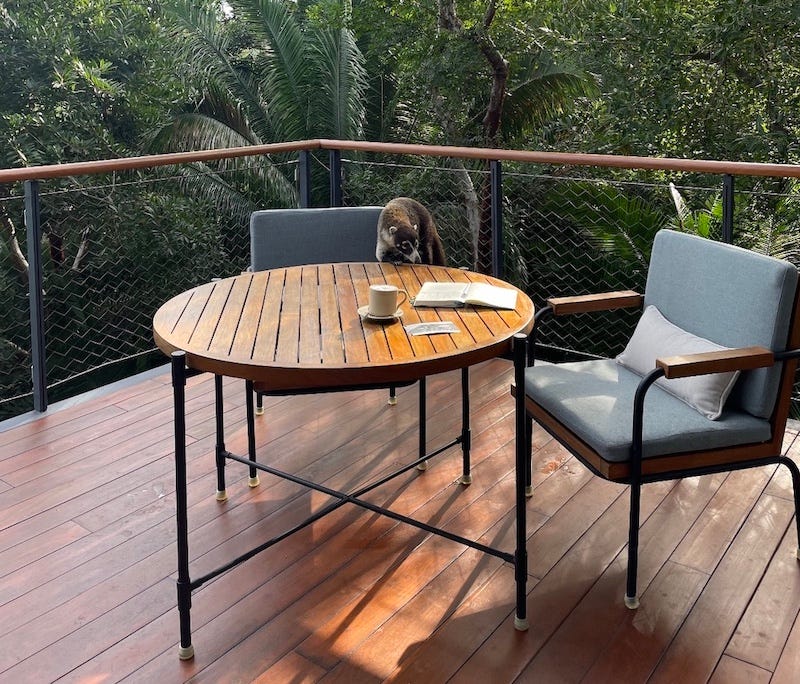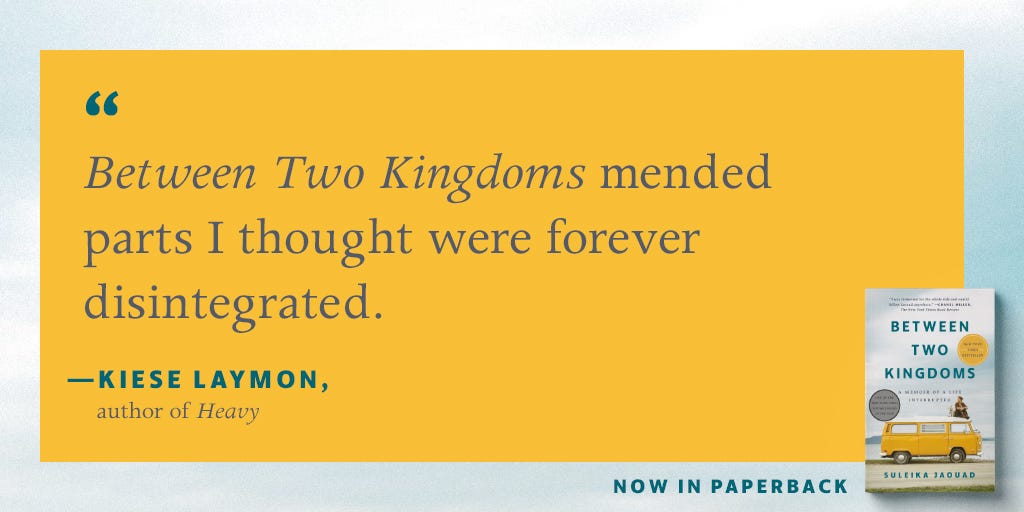Hi friend,
After spending a week with my beloved in Mexico City, we embarked on what we’ve been calling our delayed honeymoon in the Riviera Nayarit. We’ve been staying in a treehouse in a lush forest—nestled in the canopy, fifty-two meters up in the air, with the most gorgeous views of the Pacific. The last few days, I’ve been doing such good thinking, partly because I finally have some energy, partly because these aerial views are inviting a different perspective.
What’s been on my mind most recently is the way people move in and out of our lives. I think this is for a couple of reasons, one being that while in Mexico City, I met up with an old friend from college. We were very close back then—she even came and visited me in Paris—but over the course of many moves and getting married, work and other life events, we lost touch. I wondered, How do you reconnect after almost a decade? But the second we saw each other, it was as if not a day had passed. Breakfast turned into a long, meandering hang, where we wandered the city, chatting and window shopping, basking in the glorious warmth of reunion.
This week, I also received news that someone I’m very close to and love so deeply is really not doing well. They’ve been terminally ill for some time, and the last few months, I’ve been doing the classic thing that people do: rather than reaching out as often as I want to, I feel myself shut down. Obviously because of my own circumstances, I feel tender; it raises my own selfish fears. But I also haven’t been able to confront the unavoidable grief. The notion of a final goodbye feels impossible.
I think there’s a bit of a compounding effect—that I lost so many friends to cancer in my twenties, that I’ve already said so many goodbyes. There have been times I’ve sworn off making new friends, for fear of more grief, more loss. I’ve started following in my father’s footsteps when a loved one leaves my house: I hide a glass of water behind my back and splash it on the back windshield as they drive away. In Tunisian tradition, it’s meant to assure their safe return.
Yet as much as I dread goodbyes big and small, as anxious as they make me, I have never regretted a fully realized one. I think of my friend Anjali, whose bedside I sat by as she took her last breaths, and I feel proud of the goodbye that we walked toward together. Being with someone in their final moments is a deep and sacred privilege, and in some ways, it allows for a less complicated grief. You can take comfort in the fact that you showed up, that you chose love over fear, that you didn’t turn away in the face of the hardest thing. There have been times I haven’t been able to do that, and those are the goodbyes that leave a haunting regret.
The brilliant writer and my fellow Brooklynite LaTonya Yvette has written so beautifully about this very subject—and today I’m so thrilled to share her essay called “The Shape of Goodbye.” I hope it brings you insight into the goodbyes in your own life and allows you to make peace with them, if only on the page.
With love from this little kudamundi and me,
Suleika
Some Items of Note—
I was so moved by your comments on my photo essay, My Year of Love. It’s my new favorite form of journaling. I hope you’ll try it out too!
Recently someone asked me what my creative set-up is in the hospital, and I was reminded of a little behind-the-scenes video I made last year from the bone marrow transplant unit. Watch it here!
In the Isolation Journals Chat, we’re continuing our weekly ritual: our chorus of collective gratitude. You can add yours here!
Prompt 227. The Shape of Goodbye by LaTonya Yvette
My mother was terrible at goodbyes. Her nickname was Waterhead, since she cried at nearly every goodbye, the kind of cry that turned her banana-colored skin red, made a thick, green vein pop from her forehead, and exposed her tendency to blubber in a heartfelt and laughable way. She had to say more goodbyes than I could count, whether because of sudden death or unmet expectations. I also am terrible at goodbyes. If I do better than my mother, it’s because she faced and bore the unimaginable, making the way a little easier for me.
For my friends and family who know me well, I don’t speak words, I look at them and my eyes say, Okay, I am going to run and make this the least kind of painful. Goodbyes, I suppose, get easier within generations, but lately I’ve been thinking about them within the context of our lives, and the interrelation between our traumas, the people and things we must say farewell to. Like my father, who journeyed from Colón, Panama, to New York City, in the 1970s. He immigrated with his mother, right behind his father, and said goodbye to customs, language, and familiarity. I wonder how these, along with all my mother’s goodbyes, have been passed down to me.
My dad has been dead for fourteen years this September. Every September, before I realize the time of year, I spend two full weeks feeling foreign, wondering why the bottom of my feet seem to have given out as I trudge along the concrete of New York City, which once upon a time became his adopted sanctuary. Fourteen years of mourning a non-goodbye-goodbye, and sifting through what remains of him and his choices, somewhere inside of me.
While meditating this morning, I prayed for the long string of goodbyes I’ve asked my body to absorb: The ones that weren’t quick; the ones where words weren’t compulsory, or needed more language, more clarity, more feeling; the ones that should have happened but didn’t; the ones that did but the heaviness multiplied in their lacking. Yes, fourteen years since my dad died. Seven years since I began therapy. And thirty-seven days since I arrived at the conclusion that all those old goodbyes can sprinkle their dust on the new ones. It circles back to the same damn thing: Goodbyes are hard, y’all.
When Serena Williams announced she was retiring from tennis last year, she let us down in the easiest way possible: a Vogue magazine cover photo of her beautiful figure on a beach, in a sky blue Balenciaga gown. At first, all you notice is Serena’s frame, the setting, and what feels eerily familiar to reaching the pearly gates of Heaven. She is freedom and strength personified. As your eye strolls over to the right, you find Olympia, her five-year-old daughter, and her husband, Alexis Ohanian. Suddenly, the goodbye feels different. It’s the metamorphosis of a complex goodbye: reluctance and heartbreak but also joy.
Goodbyes are evolution and transition she tells Vogue—words that I, too, have said. What remains true for all of us is the importance of how we say goodbye. The words we use to say goodbye. How we take care of others when we do. Maybe most importantly, how goodbyes make room for something new.
Your prompt for the week:
Write a goodbye you wish you’d said, or need to say.
If you’d like, you can post your response in the comments section, in our Facebook group, or on Instagram by tagging @theisolationjournals.
Today’s Contributor
LaTonya Yvette is storyteller, writer, and steward of The Mae House. She writes on motherhood, style and beauty at With Love, L, and is the author of Woman Of Color and The Hair Book. Her third book will be published by Dial Press in 2024. She lives in Brooklyn with her two children, River and Oak.
If you’re new here—hi, I’m Suleika!
I’m the author of the memoir Between Two Kingdoms, a New York Times bestseller, as well as the Emmy Award-winning column “Life, Interrupted,” which I wrote from my hospital bed when I was undergoing cancer treatment in my early 20s. I’m also a lifelong journaler, a practice that got me through my first bout with leukemia and is helping me navigate a second.
I founded the Isolation Journals in April of 2020, and it’s grown into a vibrant community of over 100,000 people from all over the world—all looking to transform life’s interruptions into creative grist. My dear friends Carmen Radley and Holly Huitt help steward this little corner of the internet, which is big-hearted and smart and just plain wonderful.
A couple last notes: First, I don’t currently look like this (less hair courtesy of chemo, more steroid-induced chipmunk cheeks). Second, if you have questions, you can check out our FAQ—or write to us at suleika@theisolationjournals.com.















My dad passed away from cancer in the 9p.m. hour on December 23, 2001. He embraced so much in his life. He memorized The Raven by Edgar Allan Poe one summer, having written it on scraps of paper. While he mowed the grass, he would stop and read a line, his lips moving as he committed it to memory, and walk along as he added it to what he had already learned. By summer’s end, he had learned it all, proudly giving me a recitation of it in the living room one evening.
The day before he passed, I curled up next to him in his bed, and read The Raven to him, his lips moving occasionally as I gave The Raven back to him.
One of the most meaningful things I’ve ever read is a quote from Ram Dass, “The truth is, we’re all just walking one another home.” My dad walked me into this world, and I helped walk him out.
Thank all of you for what you’ve shared here, and Suleika, I love you girl.
My friend has been in the ICU since November 27. On Friday I visited him again and truly absorbed, for the first time since admission, following a motorcycle accident, that he will survive this accident. I leant in close and said “I don’t come here because I think you’re going to die and each time could be a goodbye, I visit you because I know you will leave this place and remember that we were here.” It’s an investment in both our futures.